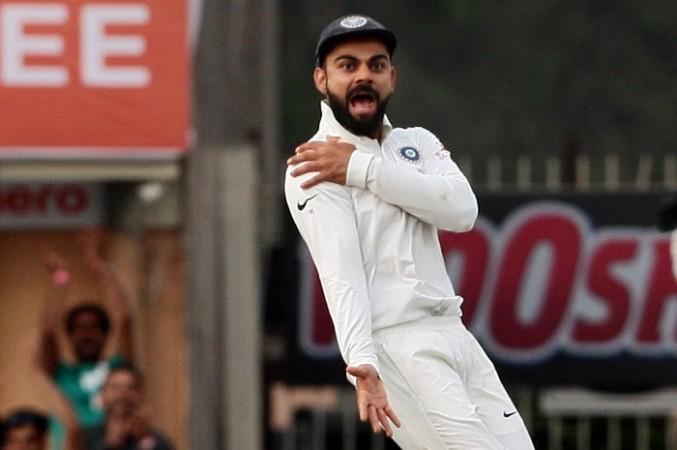
The controversial Test series between India and Australia finally came to an end on the penultimate day of the final game in Dharamsala which the hosts won by 8 wickets, bagging the series 2-1 in the process. But even after the Indians retook the Border-Gavaskar Trophy, emotions continued to run high in both camps over the attacks and counter-attacks that took place during the series.
But although India won the series, the acts of the two captains at the end of the fiercely fought series were completely contradictory and one should not doubt that it was the Australian skipper Steven Smith who handled things with more maturity.
While Smith, who was in a magnificent form in the series with three tons, apologised for letting his emotions slip during the high-voltage series. "I have been very intense in my own little bubble and at times I have let my emotions and actions just falter a little bit throughout this series and I apologise for that," Smith, 27, said.
While Smith ended the matter there, Kohli continued to drag it
The Indian captain, Virat Kohli, who missed the final Test owing to a shoulder injury he suffered in the third Test, said he no longer considered the Australian players his friends after they constantly targeted him on and off the field. It was the same Kohli who had said prior to the beginning of the series that things that are done or said in the heat of the moment are forgotten despite all the intensity.
After the series concluded, Kohli said he was proved wrong and one would not hear him saying such things about friendship continuing despite the heated talks ever again.
This is not the first time that Kohli has had problems with Australia
The take by the Indian skipper, aged 28, sounded childish. It is not that Kohli has had a sour experience with anything Australian for the first time in this series. In 2012, he had made the headlines by showing his middle finger to a group of spectators who had allegedly targeted him during a Test match in Sydney. During the 2014-15 series when Kohli captained the side Down Under after a sudden retirement of Mahendra Singh Dhoni, his captaincy came under criticism from former Australian players Ian Chappell and Michael Clarke who felt his tactics were left wanting.
Having gone through the learning curve that a cricketer does in the most gruelling tour in the world, why did Kohli take things so seriously when it came to a home series against the Aussies? Or was his poor batting form in the series the reason behind him losing his composure?
Aussies always target the No.1 in the opponent team; they have targeted Tendulkar in the past
Kohli must have known that it is a common strategy of the Australians to target the best man in the opponents' ranks. The same had been seen when Sachin Tendulkar was India's No. 1 bet against them. An Indian team led by the maestro was decimated in Australia in the 1999-2000 series. But despite all, one had never heard of Tendulkar making controversial remarks that could only hurt his team's prospects and not the opponents.
Even Dhoni was not heard of saying such things after facing whitewashes in England and Australia. Given the stature of the man, it was completely unexpected that Kohli would make such a remark, giving enough hint that he is not going to forgive the Australians any time soon.
With IPL almost here, can Kohli keep his words?
This brings us to the question: Will Kohli continue to ignore Australian players in the Indian Premier League starting April 5 as a fallout of a bygone series? Given the way cricket is played nowadays where the distinction between the country and the club is more blurred than ever, such show of rigidity doesn't suit Kohli. Will he soon soften his stand and allow everything to become normal?
Rooney and Cristiano Ronaldo had a spat during WC but still they remained mates in club
In team games, it is always advisable to leave all the on-ground sentiments in the ground itself so that the team spirit doesn't get ruptured. We have seen enough instances of such on-field confrontations between footballers while appearing for their respective countries but yet they bury the hatchet while playing professional football for clubs. An example is the spat between England's Wayne Rooney and Portugal's Cristiano Ronaldo during a World Cup match in 2006. The incident didn't have any impact on the two players who were also mates in Manchester United at the time. if Kohli considers Ronaldo his role model, then why didn't he learn this aspect from the latter as well?
Yes, there was John McEnroe who refused to stay in the same hotel where his opponent in the final of a tournament checked in because of the intense rivalry but McEnroe's sport is not about a team and there is little possibility of an entire outfit suffering because of one individual.
Kohli needs to grow up. It is disappointing that the ace batsman, despite leading India in a dream run with several back-to-back series victories, has found his mind getting trapped by a deliberate ploy by the Aussies to get the opponents' No.1 player. The Australians won't be complaining after seeing Kohli's outburst.
Having already registered himself as the third-most successful Indian captain in Tests, one would have expected the man to transform form an impulsive youngster to a more cool-headed captain. But by "losing friends" after winning a tough series, Kohli proved that he is yet to fully turn into a man.
Kohli has come a long way as a batsman. Will he now focus on covering the same journey as a captain?

















